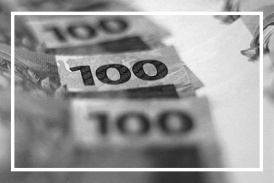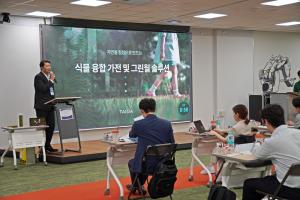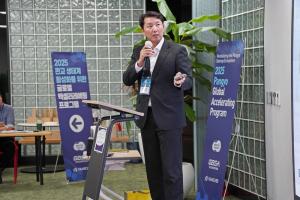Taiga showcases moss-based green appliances and smart green walls at Pan-Pan Day: Expanding to North America and Europe
Taiga showcases moss-based green tech at Pan-Pan Day, eyeing global growth with smart green walls and appliances for wellness and climate adaptation.
PANGYO, GYEONGGI-DO, SOUTH KOREA, June 5, 2025 /EINPresswire.com/ -- Taiga (CEO Wonseok John Lee) introduced its moss-based indoor nature solution and hybrid home appliance solution, Mosslab, at “Pan-Pan Day with G-Fund Operators” on May 22 at Pangyo Startup Campus, drawing attention as a futuristic urban environment solution.Pan-Pan Day is a networking-based accelerator program hosted by Gyeonggi Province and the Gyeonggi Business & Science Accelerator (GBSA). It is designed to foster investment and technology exchange between G-Fund operators, major investors, and promising local startups.
“Our quality of life has declined due to decreasing indoor greenery caused by industrialization and urbanization,” said Lee. “Through moss-based fusion technology, Taiga offers benefits such as air purification, carbon reduction, and psychological recovery, proposing a sustainable urban environment.”
Taiga has commercialized smart green wall and hybrid appliance solutions for various indoor and outdoor spaces based on its proprietary mass moss cultivation technology using tissue culture and the modular installation method “Lighting Pole.” The technology has proven performance in reducing carbon dioxide, volatile organic compounds (VOCs), and fine dust. It is certified with KC electromagnetic compliance, UK Allergy Association approval, and CE/RoHS and FCC certifications.
The company’s flagship products include the moss-based humidifier “Moss Air,” the LED display-integrated “Moss Echo,” and the modular green wall “Moss Hexa.” Moss Air, in particular, raised approximately USD 800,000 through crowdfunding and has sold over 20,000 units in the U.S.
In the B2B market, Taiga has introduced “Nature Signage,” a high-value fusion product that provides indoor air purification while broadcasting digital content (information, advertisements, entertainment). It targets corporate clients such as airports, hospitals, hotels, and offices.
Taiga operates a 26446 sqm moss farm in Taean, Chungnam, establishing a mass supply system. The company has also set up a U.S. branch and obtained USDA import and quarantine clearance, securing a stable entry into the North American market. Taiga plans to expand exports to Europe and the Middle East this year.
“In an era where natural experiences are lacking in urban life, plant-based fusion technology offers a solution for wellness and climate adaptation,” said Lee. “We aim to become a sustainable nature-tech company with KRW 50 billion in sales by 2027.”
The company also participates in the “2025 Pangyo Global Accelerating (AC)” program, hosted by GBSA’s Pangyo Techno Valley Planning Team and operated by Y&Archer. The program supports high-potential startups preparing for global expansion through office space, overseas demo day participation, enhanced English-language IR, and international partnership building.
Pangyo Techno Valley is a global R&D hub that integrates Research (R), People (P), Information (I), and Trade (T) across the IT, BT, CT, NT, and mobility sectors. It is a leading innovation cluster in Gyeonggi-do, established to drive technological innovation, talent development, job creation, and international business competitiveness.
The Gyeonggi Business and Science Accelerator’s Techno Valley Innovation Headquarters has continuously promoted Pangyo Techno Valley’s value by hosting events such as the Pangyo Evening Meet-Up, Pan-Pan Day, and Pangyo Startup Investment Exchange In-Best Pangyo. These initiatives have facilitated networking between Pangyo companies, domestic and international investors, and the media. Similar events are planned for this year to support the growth and global expansion of Pangyo startups through various assistance programs.
Kim Seung Yeon
Gyeonggi Business & Science Accelerator
+82 31-776-4834
email us here
Visit us on social media:
LinkedIn
Instagram
Facebook
YouTube
Other
Legal Disclaimer:
EIN Presswire provides this news content "as is" without warranty of any kind. We do not accept any responsibility or liability for the accuracy, content, images, videos, licenses, completeness, legality, or reliability of the information contained in this article. If you have any complaints or copyright issues related to this article, kindly contact the author above.
Small Batch Company, Rendered Gold, Sources from Local Farmers to Make Natural Skincare Products Using Grass Fed Tallow
ValorFlex Packaging of Kentucky, Inc. Invests $23.4M to Relocate Operations to Bowling Green
Canada’s Bold Step Toward Becoming An Energy Super Power: Krishnan Suthanthiran’s Vision for a Sustainable Energy Future
Kalendarium
Więcej ważnych informacji
 Jedynka Newserii
Jedynka Newserii

 Jedynka Newserii
Jedynka Newserii

Finanse

Europosłowie za wydłużeniem finansowania krajowych planów odbudowy o 1,5 roku. Apelują o większą przejrzystość wydatków
Instrument na rzecz Odbudowy i Zwiększania Odporności (RRF) – uruchomiony po pandemii COVID-19 – wygasa w sierpniu 2026 roku. Europosłowie w przyjętej niedawno rezolucji postulują, by przedłużyć ten termin o 18 miesięcy dla kluczowych projektów bliskich ukończenia. To szczególnie ważne dla Polski, która przez trzy lata – przez spór poprzedniego rządu z Komisją Europejską – miała zablokowany dostęp do środków z Krajowego Planu Odbudowy (KPO). Jednocześnie rezolucja wzywa do większej przejrzystości wydawanych funduszy.
Polityka
Prof. G. Kołodko: Druga prezydentura Trumpa zmienia Amerykę i świat na gorsze. Nie przyczynia się do rozwiązywania fundamentalnych światowych problemów

Zdaniem byłego wicepremiera i ministra finansów, prof. Grzegorz Kołodki, trumpizm wzmacnia pewne trendy nacjonalizmu, populizmu ekonomicznego i handlowego nie tylko w Ameryce, ale także w innych państwach. W ocenie ekonomisty Trump i trumpizm będą mieli negatywne skutki dla światowych procesów demograficznych, społecznych, kulturowych i ekonomicznych. Prezydentura Trumpa nie skupia się na rozwiązywaniu najważniejszych światowych problemów, takich jak m.in. migracja, zimna wojna, czy też ocieplenie klimatu.
Konsument
Branża opakowań nie traktuje unijnych regulacji jako zagrożenia. Widzi w nich impuls do rozwoju

W UE co roku wytwarza się ponad 2,2 mld t odpadów. Aby ograniczyć ich ilość, promowane jest przechodzenie na bardziej zrównoważony model, czyli gospodarkę o obiegu zamkniętym. W ramach pakietu zmian prawnych ograniczających negatywny wpływ działalności człowieka na środowisko nacisk położony jest w dużej mierze na producentów opakowań. Przedstawiciele branży podkreślają, że nowe regulacje to dla nich nie tylko nowe obowiązki, ale też okazja na zbudowanie przewagi konkurencyjnej.
Partner serwisu
Szkolenia

Akademia Newserii
Akademia Newserii to projekt, w ramach którego najlepsi polscy dziennikarze biznesowi, giełdowi oraz lifestylowi, a także szkoleniowcy z wieloletnim doświadczeniem dzielą się swoją wiedzą nt. pracy z mediami.










.gif)

 |
| |
| |
|